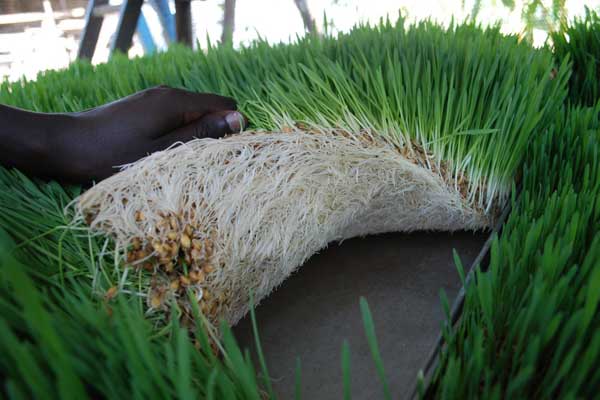Before spreading, the barley seeds will have been soaked in water for 48 hours so that they can sprout.
The 45 cubic metre structure accommodates up to 44 aluminium trays which can produce enough fodder to feed up to 25 mature pigs at Sh40 per day, compared to the commercial feed of which pigs consume three kilogrammes at Sh120 per day. The same structure also produces enough fodder to feed about 15 cows for a week as fresh fodder grows in the structure.
“Compare a 100 kilogramme bag of commercial feed to a similar bag of barley. Every kilo of barley yields about six kilos of fodder if you use the hydroponic technology but that is not the case with a bag of commercial feed,” says Wachira.
The quality of fodder is not only more nutritional than the conventional animal feed purchased in the shop but also means you don’t have to own acres to do it. This is because when the barley seeds sprout they release dormant nutrients of which 95 per cent of nutrients are useful to the livestock.
“Hydroponics is a new technology in Kenya although it has been in existence for over 200 years. In UK and other countries, this kind of vertical farming is the trend. Israel is also using this technology because they have no soil to sustain agriculture. Kenyans do not want to be left behind,” says Mbugua.
Hydroponics in Kenya: BROKE EVEN
Every Saturday between 9am and noon, the pair hosts farmers at their farm in Mwiki for training at a fee of Sh500. However, their biggest income generator is constructing the structures for farmers who have now warmed up to the idea of using the soil-less technology to grow fodder for their livestock. The 45-cubic metre structure will cost a farmer up to Sh10,000 while a 30 cubic metre one goes for Sh6,000.
The two friends started the hydroponics business in July last year. By November they broke even and started raking in profits. In a good month they make between Sh150,000 and Sh200,000 depending on the season. Last month, they posted a profit of Sh150,000 in just three weeks from constructing the structures.
“People, especially the youth, are very receptive to this new hydroponics technology. The youth have been practising this method in their farms; some even getting into trouble with their parents, but it is slowly gaining popularity. It is all about training and management,” says Wachira.
According to the two entrepreneurs, farming is a career just like any other, which the youth should seriously consider as employment. “It is a business just like any other. You have to be there to oversee it. If you don’t run your business, you will run out of business. You have to account for your money and do serious book-keeping. You must value your customers. The goal of any business is not for profit, but to satisfy your clients,” says Mbugua.
Relatives, friends and parents who wrote them off when they quit their jobs to start the business are now coming to them for consultation.
“My parents thought I was crazy to quit a well-paying job to feed pigs. Relatives were concerned. They thought I would hit rock bottom and go back to job-hunting. Many expected us to fail but after three months they believed in our vision,” says Mbugua.


hello guys can you pliz connect me with this guy who build hydroponic trays am based in ruiru and i dont have thir contacts pliz
Wachira Mwangi and Samuel Mbugua
Where can I find this guy
Kindly connect me with these guys, aam interested in the technology.my email is :[email protected]
could i have their contacts please [email protected], 0716810232 am in ruai
For those who want to be trained on how hydroponics works can follow me through my email johnnzioka35 @gmail.com
Am a director in hydroponics farming any customer needs assistanc
how can one get in touch with thus guys for training?
How do I get this system?
Hallow where can I get this seeds
Need to learn more about this hydroponic farming.my email [email protected]
Kudos mwalimu sam am also enjoying the fruits of what you taught me.
Please could you share the farmers contacts?
Good innovation. Please get me your telephone contact
please let me have your contact, i would like to attend the training
regard
Kagonia
please let me have contact for hydroponics guy in mwiki. I would like to attend their training
Would like to get your phone ni plz coz huku mashinani network ya internet ni noma. Nko ukambani
Nice job .please send me your number so as to communicate with you send
Very much interested. Am from the western part of Kenya. My contacts is 0704611731 or [email protected]
How can I reach you guys?
That’s cooool,how about the training in hydroponics, interested